
What is a Certified Recovery Friendly Campus?
A Tennessee Certified Recovery Friendly Campus (TCRFC) is a campus that has made a commitment to ensure that its students are adequately supported through following the Tennessee Collegiate Recovery Initiative best practice model as it is laid out by the Department.
What are the benefits?
Campuses will receive access to resources made available through the TCRFC portal hosted by the Tennessee Department of Mental Health and Substance Abuse Services (TDMHSAS). The portal will include tools to aid in advocating for collegiate recovery as well as videos on how to support students. In addition, the portal will also include videos specifically for students who are embarking on the recovery process.
The TCRFC will facilitate connections between valuable state and community resources (e.g., community behavioral health providers, recovery support groups, Tennessee Certified Recovery Congregations, etc.) that will bridge the gap between the recovery community as a whole and the recovering population at said institution.
Campuses will receive direct support from the Tennessee Collegiate Recovery Initiative (TCRI) Director, in the planning of events, hosting trainings, and connecting students with necessary recovery support needs.
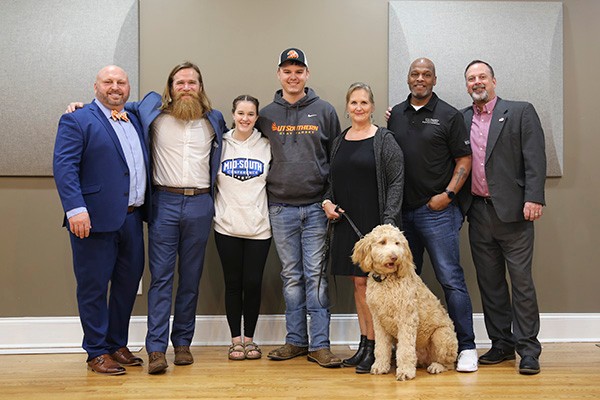
Collegiate Recovery Inititaive Director Nathan Payne poses with fellow presenters and campus advocates after an event at UT Southern.
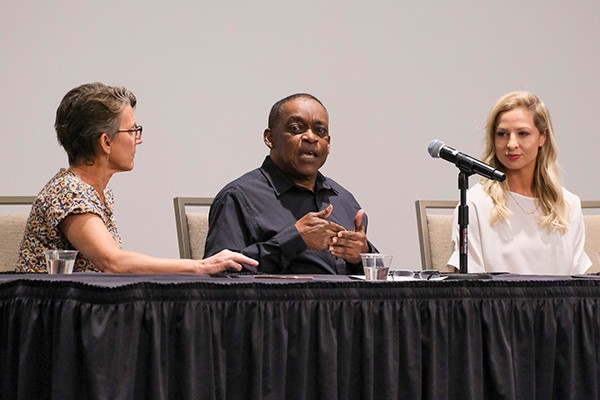
Panelists in recovery share their experience, strength, and hope with attendees of an event at East Tennessee State University.

University of Tennessee President Randy Boyd shares his passion for collegiate recovery at an event at UT Knoxville.
How does my campus become a TCRFC?
1. Identify an individual in a Leadership/Admin role on your campus interested to be active, vocal, and supportive of recovery efforts on campus. It is preferred that this person is connected to the Campus Student Support/Wellness Center.
- Being active, supportive, and vocal about the initiative on campus
- Encourage other staff, faculty, and students to be aware of, and hopefully, a part of the initiative
2. Identify a faculty member interested in working with a student volunteer and serving as point of contact between the campus and the TCRI Director.
- Sending out mass emails for events as organized by student liaisons and ensuring the students have access to campus services such as: printing, branding, space reservations, contact with fellow departments and faculty members, etc.
- The faculty member will fill any gaps and verify the students are operating within the appropriate guidelines as per campus policy.
- Be the campus point of contact for all things related to the TCRFC on that campus.
- If a student, with appropriate time in recovery, is identified, faculty member, alongside TCRI Director, will help student find and reserve space to hold recovery meetings. Recovery meetings will be influenced by the best practice model as laid out by the Association of Recovery in Higher Education
- Coordinate one (1) meeting per semester with the TCRI Director to ensure the best practice model is being followed and discuss ways to broaden recovery outreach can be sustained and bolstered on the campus.
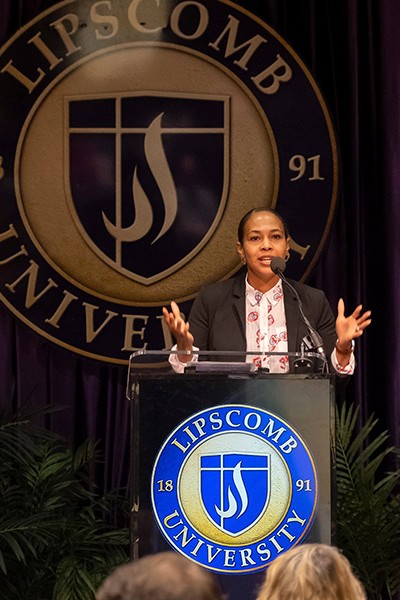
Dr. DeAndria Witherspoon-Nash speaks at the first-ever Collegiate Recovery Academy at Lipscomb University
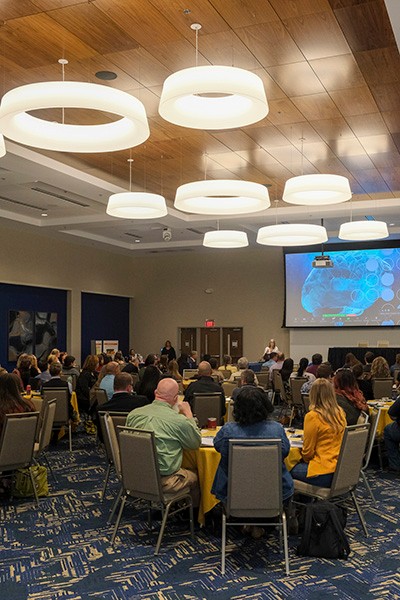
A packed crowd at the ETSU Collegiate Recovery Academy
3. Identify a student volunteer who is passionate about creating and sustaining conversations on campus around recovery support as well as providing a list of resources to new students in recovery.
- Meeting monthly via Zoom, Teams, or other conferencing method for one hour with the TCRI Director and other liaisons across the state. This will create a platform to share ideas, lessons learned, etc.
- Work with the TCRI Director to organize a minimum of one (1) alternative activity, event, or social norms campaign on campus per semester (examples include tabling, social media campaigns, or student engagement event). The TCRFC will provide feedback on ideas, events, etc. and this will be more of a feedback loop.
- Greeting new students entering recovery and connecting them with available resources on campus and in the broader campus community.
4. Organize a Recovery Ally training, facilitated by TDMHSAS and the TCRI Director, with a minimum of five individuals, three of which are to be faculty, the remaining two may be student and or staff, committed to attend.
- Recovery Ally: Their primary purpose is to raise awareness, increase understanding, and build confidence in those eager to help people who may be struggling with addiction, mental health concerns, and/or any other life controlling issues on campus.
- Recovery Ally Training: It is designed to equip participants with the appropriate knowledge needed to better address problems with substance misuse and other concerns that may exist on campus.
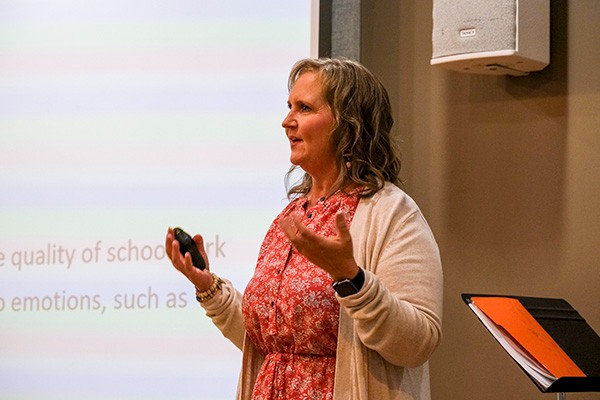
Mary Anne Christian with TSPN provides a suicide prevention training at a collegiate recovery event.
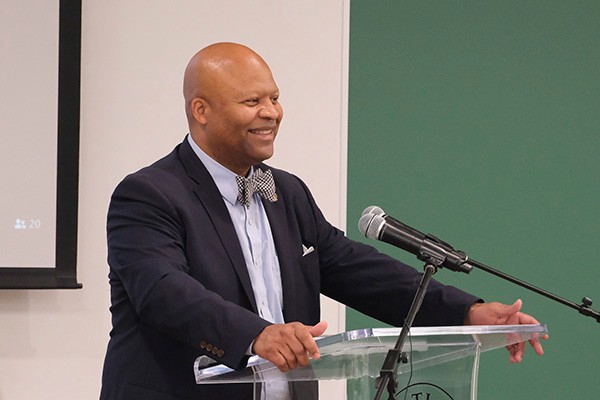
Motlow State Community College President Dr. Michael Torrence energizes the crowd with his enthusiasm for collegiate recovery.
5. Campuses must make a commitment to follow the Best Practice Model as it is laid out per the TCRFC and will be required to recertify each year to maintain their certification.
- View substance use disorder and mental health concerns as treatable conditions.
- Understand the definition of recovery as is illustrated by the Substance Abuse and Mental Health Services Administration (SAMHSA) and acknowledge the role that college may play in an individual’s recovery journey.
- Make readily available, through partnerships with TDMHSAS and TCRI Director, resources pertaining to behavioral health.
- Assist in connecting individuals struggling behavioral health issues to treatment and/or other recovery services.
- Acknowledge the narrative on college campuses often centers around risky behaviors and recognize the need to influence this narrative.
- Attend TCRFC meetings with the TCRI Director. For administration/leadership and staff/faculty volunteers this will be in the form of a regional, in person, meeting to be held once per semester to facilitate connections and opportunity for growth.
- In partnership with the TCRI Director, coordinate Recovery Ally and subsequent trainings on campus (one (1) per semester) and aim to identify Recovery Allies across each campus department.
- In partnership with the TCRI Director, organize campus wide TCRFC alternative social event (add hyperlink including examples) (one (1) per semester).
- Administration/leadership will support an annual Faculty Institute centered around Behavioral Health, Trauma Informed Care, and/or Suicide Prevention.
Creating a dedicated space for your collegiate recovery program isn't required in the best practice model, but you might find it's a great way to support and sustain the initiative on your campus. We put together some research and ideas on dedicated space for you to review at this link.
Contact Information
Ready to take the next step? Reach out to the director of our Collegiate Recovery Initiative using the contact information below.
Nathan Payne
Director, Collegiate Recovery Initiative
615-712-4343
npayne@tamho.org
